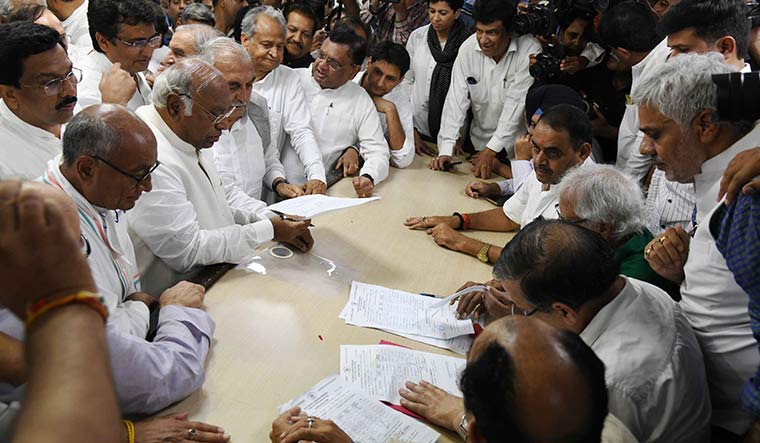Veteran Congress leader Mallikarjun Kharge won his first assembly election in 1972 and repeated the feat a record eight times. He won the parliamentary polls in 2009 and 2014; it was in 2019 that he suffered his first electoral defeat. In the Congress presidential election, scheduled for October 17, his opponent Shashi Tharoor is a relative newcomer.
Their political experience is not the only area where the two candidates differ—they also have distinct personalities and are from disparate backgrounds. They are the two poles in an election that has generated immense buzz. A key reason for the interest is novelty, because it is after 22 years that the grand old party is having a presidential election. And, it will be after 24 years that a non-Gandhi becomes president.
Kharge, 80, who resigned as leader of opposition in the Rajya Sabha after he filed his nomination, has vast experience as an administrator and organisation man. He was the home minister in the S.M. Krishna government in Karnataka and a Union minister in the Manmohan Singh regime. It is said that the one post he really wanted was chief minister of Karnataka, but he lost out to other claimants on more than one occasion.
Thiruvananthapuram MP Tharoor, 66, is a former international civil servant. A third-term MP, he has served as Union minister of state for human resource development and later external affairs in the Manmohan Singh government. Like Kharge, there is a post he coveted and failed to win—Tharoor finished a close second to Ban Ki-moon in the United Nations secretary general's election in 2006.
Kharge's image is that of a person from a humble background and a major part of his identity is that he is dalit, though he prefers not to be defined solely by his caste. Tharoor, in contrast, is perceived as being from privilege. Kharge is earthy and is known primarily for his hands-on style, while Tharoor's persona is more esoteric and intellectual because of his diplomatic and literary career. Kharge speaks in a simple and straightforward manner. Tharoor is flamboyant and is known for his oratory.
Then, there are the differences which reveal who is expected to have an upper hand in the election. Although the Gandhi family has said that it will remain neutral, Kharge, evidently, enjoys the backing of the high command. His nomination saw the top rung of the Congress backing his candidature, including members of the so-called Group of 23. Tharoor had only a few significant names to show in his list of proposers.
“Mallikarjun Kharge is a highly experienced leader,” said senior Congress leader and AICC Treasurer Pawan Kumar Bansal. “I remember when I was minister in the UPA government and had gone to Karnataka, he had organised a well-attended meeting in a short period of time. He is in touch with issues of the poor and will take everyone along.”
The surprise decision of the G23 leaders to support Kharge is learnt to have come after the veteran reached out to them. They decided that since their main demand of election to the post of party president had been met, they should back Kharge and ensure a say in reforms under the new president, including elections to the working committee and setting up the party's parliamentary board. Besides, the G23 leaders are learnt to be miffed by Tharoor not having consulted them on his candidature.
“Having a presidential election was among our main demands,” said former Maharashtra chief minister Prithviraj Chavan, who was one of the signatories to the letter sent by the G23 to Sonia in 2020 demanding major reforms. “Mallikarjun Kharge reached out for support. We decided to back him taking into account his seniority and experience and we feel he can take everyone together. Now, we will press our demand for election to the CWC.”
Tharoor has positioned himself as a leader with a vision for the future, as someone who wants to change the status quo and bring in reforms in the party. He has described Kharge as representing continuity and insists that he himself stands for change. While he has spoken about the changes he wants to make, Kharge has been more cautious, stating that if elected he will consult other leaders, including the Gandhis, on the changes needed.
Lok Sabha MP Pradyut Bordoloi, among the proposers of Tharoor's candidature, said the party needed new ideas and a dynamic leadership. “I believe Shashi Tharoor is in sync with the aspirations of the new generation,” he said. “He is erudite, has clarity on the reforms needed and is a firm believer in liberal democracy.”
Tharoor may not be wrong in describing Kharge as a protector of the status quo since fending off attacks of dynastic rule appears to be the most important aspect of having a non-Gandhi at the helm. Leaders agree that the Gandhis will continue to hold sway and have a unique position in the party. Rahul's ongoing Bharat Jodo Yatra is cited as an example. It is believed that the yatra will help project Rahul as the challenger to Prime Minister Narendra Modi in 2024. In such a scenario, the party hopes that an arrangement akin to the BJP, where J.P. Nadda runs the party and Modi and Home Minister Amit Shah provide political heft, will come into play for the Congress.
Most senior leaders acknowledge that Kharge is the frontrunner. However, it is also felt that Tharoor being on the other side is leading to much-needed activity within the party. Veteran Kashmir Congress leader Saifuddin Soz, who, along with son Salman, signed as Tharoor's proposers, said: “I am committed to supporting [Tharoor]. But, I have great respect for Kharge ji. We have two different personalities with different qualities, making for an interesting election.”


